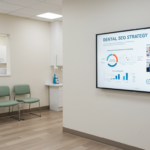What is CRM (Customer Relationship Management)?
Simply put, building strong relationships with customers is essential for growth and long-term success. But with so many customers and so much data, how do businesses manage it all? Enter Customer Relationship Management (CRM). This tool has become the backbone of customer interaction, providing businesses with the framework to manage relationships, boost sales, and improve customer service.
But what exactly is CRM, and how can it help your business? Let’s dive into this world of customer-centric strategy.
Understanding CRM
What is CRM?
Customer Relationship Management (CRM) is more than just software. It’s a strategy that helps businesses manage interactions with current and potential customers. A CRM system provides a centralised platform for storing customer data, tracking interactions, and facilitating communication between teams. Whether it’s handling a sales enquiry or managing a long-term client, CRM systems help companies stay organised, efficient, and customer-focused.
The Evolution of CRM Systems
CRM systems have evolved significantly over the years. Initially, businesses used manual systems, like spreadsheets, to track customer details. As technology advanced, CRM systems became more sophisticated, moving from basic databases to full-fledged cloud-based platforms that can manage sales, customer service, marketing automation, and analytics.
Benefits of CRM Systems
Improved Customer Relationships
One of the key benefits of a CRM system is that it improves relationships with customers. By having all customer data in one place, teams can quickly access information and tailor their communications. Whether you’re sending an email or making a call, CRM helps you connect with customers in a way that feels personal and thoughtful.
Better Data Management
With CRM, gone are the days of sifting through multiple databases to find customer details. Everything is stored in one centralised system, making it easier to track customer history, preferences, and interactions. This means you can manage your customer relationships with a lot less stress. Read more about CRM databases here.
Enhanced Sales and Profitability
A well-implemented CRM system can significantly boost sales. It does this by streamlining sales processes, enabling better customer segmentation, and providing insights that help your team focus on the most valuable leads. This leads to increased conversions and, ultimately, higher profits.
Key Features of CRM Software
Contact Management
At its core, CRM is about managing customer information. This includes basic details like name, address, and contact info, but it also tracks every interaction a customer has with your business. The system helps you stay on top of customer needs and preferences.
Sales Management
A robust CRM platform includes tools to manage sales pipelines, track deals, and monitor performance. Sales teams can use CRM to manage their leads, follow up on potential opportunities, and close more deals faster.
Customer Support and Service
CRM systems offer built-in tools to support customer service teams. Whether a customer is calling in with an issue or submitting an online ticket, CRM helps teams manage and resolve queries efficiently, improving overall customer satisfaction.
Integration with Other Tools
CRM systems integrate seamlessly with other business tools, such as email marketing platforms, accounting software, and e-commerce systems. This ensures a smooth flow of data between departments, making the customer journey more seamless.
Reporting and Analytics
One of the most valuable features of CRM is its ability to provide insightful reports and analytics. This helps businesses track performance, understand customer behaviour, and make data-driven decisions.
Read our in-depth blog on CRM software here.
Types of CRM Systems
Operational CRM
Operational CRM focuses on automating and streamlining customer-facing processes like sales, marketing, and customer service. The goal is to create a more efficient workflow, reducing the manual tasks your team has to handle.
Automation in Operational CRM
Operational CRM systems often come with marketing automation features. This means that emails, follow-ups, and even certain aspects of customer service can be automated, freeing up valuable time for your staff.
Analytical CRM
Analytical CRM, on the other hand, focuses on analysing customer data. It helps businesses understand trends, segment customers, and predict future behaviours based on past data.
How Analytical CRM Helps Businesses
Through data analysis, businesses can make better marketing and sales decisions. For example, if a certain type of customer is more likely to convert, your team can focus efforts on that segment, resulting in higher ROI.
Collaborative CRM
Collaborative CRM systems are designed to improve communication between teams. Sales, marketing, and customer service teams all work together within the CRM platform to share information and insights, leading to better customer service and stronger relationships.
Facilitating Teamwork and Collaboration
Collaboration across teams is essential for providing a seamless customer experience. With CRM, everyone has access to the same information, making it easier to work together and solve problems quickly.
How CRM Improves Customer Experience
Personalised Customer Journeys
Personalisation is the future of customer service, and CRM makes it possible. By collecting and storing customer data, businesses can create personalised experiences that make customers feel valued. This could be as simple as sending a birthday message or recommending a product based on past purchases.
Why Personalisation Matters
People love to feel special, and personalisation shows customers that you care. It helps build loyalty and trust, which are essential for long-term success.
Faster Response Times
When customers reach out, they expect quick responses. CRM helps teams track and manage customer interactions so they can respond faster, whether it’s through email, phone, or social media.
Building Customer Loyalty Through Quick Responses
Fast, efficient communication helps build trust with customers. When they know you’re there for them, they’re more likely to stay loyal to your brand.
CRM and Sales Management
How CRM Boosts Sales Efficiency
CRM systems help sales teams be more efficient by providing them with the tools they need to track leads, manage relationships, and close deals. The automation features in CRM ensure that no lead slips through the cracks.
Tracking Sales Performance
Tracking sales performance is key to growing your business. CRM systems come with built-in reporting tools that help sales teams monitor their performance, identify areas for improvement, and celebrate wins.
Importance of Performance Tracking in Sales Growth
By understanding what works and what doesn’t, sales teams can refine their strategies and focus on what really drives results.
CRM for Small vs Large Businesses
Customisation for Small Businesses
Small businesses often require a more tailored CRM solution. The good news is that CRM systems are highly customisable, allowing small businesses to use only the features they need and grow as they scale.
Scalability for Large Organisations
For large businesses, CRM systems provide scalability. They can handle vast amounts of data, manage complex customer relationships, and integrate with multiple tools, making them ideal for large organisations.
CRM Implementation Best Practices
Planning and Strategy
Implementing a CRM system requires careful planning. Businesses need to set clear goals for what they want to achieve, whether it’s improving customer service, boosting sales, or increasing efficiency.
Identifying Key Goals
Before implementation, it’s essential to know what you want out of the system. This will guide the setup process and ensure you get the most value from your CRM investment.
Employee Training
Even the best CRM system won’t work if your team doesn’t know how to use it. Training your employees on how to use the system effectively is crucial for success.
Importance of Getting Everyone Onboard
When everyone understands how to use CRM, it leads to better adoption and results. A smooth implementation means your team can hit the ground running.
The Future of CRM
AI and Automation in CRM
Artificial Intelligence (AI) and automation are revolutionising CRM. With AI, businesses can predict customer needs, automate responses, and offer smarter, more personalised customer experiences.
Future Trends Shaping CRM
The future of CRM is all about automation, personalisation, and integration. As businesses become more customer-centric, CRM systems will continue to evolve to meet these needs.
Conclusion
CRM has become an indispensable tool for businesses of all sizes. From improving customer relationships to boosting sales efficiency, the benefits of CRM are undeniable. As technology continues to evolve, so too will CRM systems, helping businesses stay ahead in an increasingly competitive market. Whether you’re a small business or a large organisation, investing in a CRM system is a step towards better customer management, enhanced productivity, and sustainable growth.
FAQs
There are three main types of CRM: Operational, Analytical, and Collaborative. Each serves a different function, from automating processes to analysing customer data and improving collaboration between teams.
Absolutely! CRM systems can be customised to fit the needs of small businesses, helping them manage customer relationships, track sales, and grow more efficiently.
The cost of CRM software varies depending on the provider and the features you need. Some basic CRM solutions are available for free, while more advanced systems can range from £10 to £200+ per user per month.
No, CRM systems are used across various departments including marketing, customer service, and support teams. It helps manage relationships at every stage of the customer journey.
Most CRM systems take data security very seriously, offering encryption, two-factor authentication, and other security measures to protect sensitive customer information.









